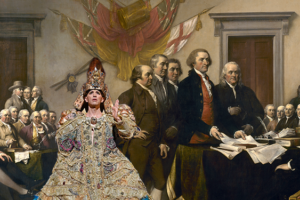
With the Met opening in one week, literally everyone is studying for the new production of Tristan und Isolde, including your alte Jungfer’s requisite Kuschelkatze (pictured) who arrived on my doorstep in Mariahilf with the name of Tristan.
It seems we just got through contemplating love and death and the whole enchilada with last month’s Bayreuth broadcasts, but I felt this 1972 performance from the early days of the Osterfestspiele Salzburg starring Jon Vickers, Helga Dernesch, Christa Ludwig, and Walter Berry warranted a listen.
I was never much of a fan of Herbert von Karajan, but I have to say this is one of the most exciting performances of Tristan I’ve ever heard. I recall many complaints about his sterile, “chamber music” approach to Wagner when he was still around, but here I find him to be at times white-hot. His second act is even faster than Karl Böhm’s legendary 1966 performance, bringing it in at 68 minutes (I haven’t followed with my score which, as you can see, is in other hands – or rather, paws – at the moment; could there be cuts, perhaps in Melot’s music?).
This is the same cast deployed for Karajan’s much-debated “it’s a matter of taste” EMI recording made in December 1971 and January 1972, but many of the complaints – “turgid” tempi (as per an Amazon review) and studio diddling – don’t apply here. Karajan knocks 20 minutes off the running time of the commercial recording, and the spontaneity of the live performance and the acoustics of Salzburg’s Großes Festspielhaus work to everyone’s advantage.
Vickers, of course, owned the role of Tristan, and it will take a damned long time for the memory to fade. Need I say more?
It would seem that Helga Dernesch allowed herself to unwisely be talked into taking on most of the dramatic soprano roles she filled once Birgit Nilsson and Karajan ceased speaking to each other (although Georg Solti, too, cast her as Elisabeth in his recording of Tannhäuser; Leonie Rysanek was the one with whom he wasn’t speaking). While her “short top” is definitely the weak link here, she occasionally knocks one out of the park and provides many expressive and exciting moments with her compelling interpretation.
Sanity eventually prevailed before too much vocal damage was done and she successfully extended what most likely would have been a much shorter career with a successful transition back to the mezzo Fach in which she began. Her decade at the Met included fabulous performances as a regal Fricka, a devious, sexual Herodias in Nikolaus Lehnhoff’s demented production of Salome (which I loved), and a scary Amme in Die Frau ohne Schatten.
The Leitmetzerin Sammlung contains a handwritten letter from Christa Ludwig, undated but postmarked 22 September 1971, on stationery from the Holiday Lodge in San Francisco in which she wrote to me, “I am very sorry but I will not sing Brangäne at the Met [she had been announced for the new production which opened on 18 November 1971 with Mignon Dunn in the role], because I cancelled their opera. (I do not like Brangäne.) So I shall sing on N.Y. at the 31st of October 2 o’clock in Carnegie Hall an all Brahms recital with Leonard Bernstein at the piano. Perhaps you’ll come?”
She seems to have changed her mind for Karajan (or couldn’t get out of the contract as easily as she could in those first post-Rudolf Bing years at the Met) and pours her luscious, velvety tone into the role for what was likely the last time. It seems she really didn’t like Brangäne: she sang her only twice at Wiener Staatsoper (1956 and 1958), thrice with the Met (1960), once in Bayreuth (1966), and in two of the three 1972 Salzburg performances from which this recording is taken.
It would also appear the former Mr. Ludwig, Walter Berry, did not like Kurwenal: these Salzburg performances seem to be the only time he sang the role.
Karl Ridderbusch was not yet 40 when he took on Marke, and makes an introspective, young king. Medical problems cut short his career and he died shortly after his 65th birthday.
As for my Tristan, he was abandoned in a park in Wien in 2013 in his cat cage with his vet papers, which is how I know his name (I have always tried to avoid the cliché of bestowing my cats with operatic names) and age (he is now five). When he’s not curled up next to – or on – me (he likes to maneuver his head into the palm of my hand and fall asleep, rendering me motionless), he’s busy breaking things (antique lamp, coffee maker, etc.) or grabbing and diverting my hand to his mouth as I attempt to raise a utensil (he had blueberry soy yogurt on his nose the other day). I have never had a more mischievous cat or one who kept me laughing so much. If you ever decide to share your life with an animal, I strongly recommend that you check out a shelter before patronizing a pet shop.
Post scriptum: Keeping a promise made several weeks ago, I uploaded the world premiere of Thomas Adès’ The Exterminating Angel to my Mixcloud site last week, as well as a complete performance of Who’s Afraid of Virginia Woolf? with the original 1962 Broadway cast headed by Uta Hagen and Arthur Hill in memory of Edward Albee, directed by my mentor and friend Alan Schneider.
























Comments